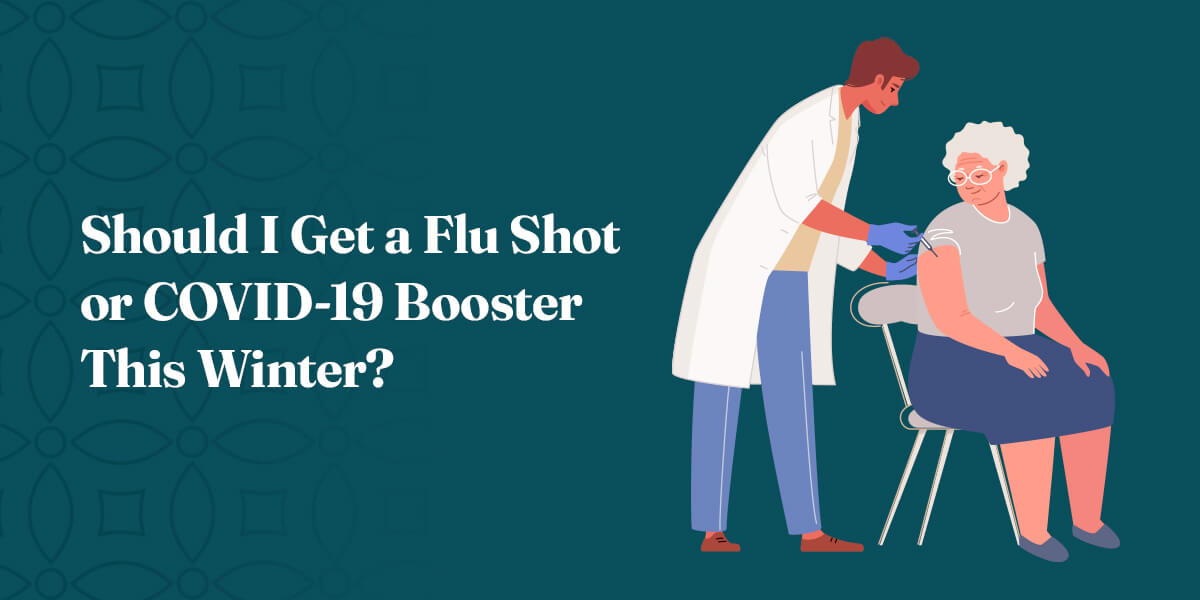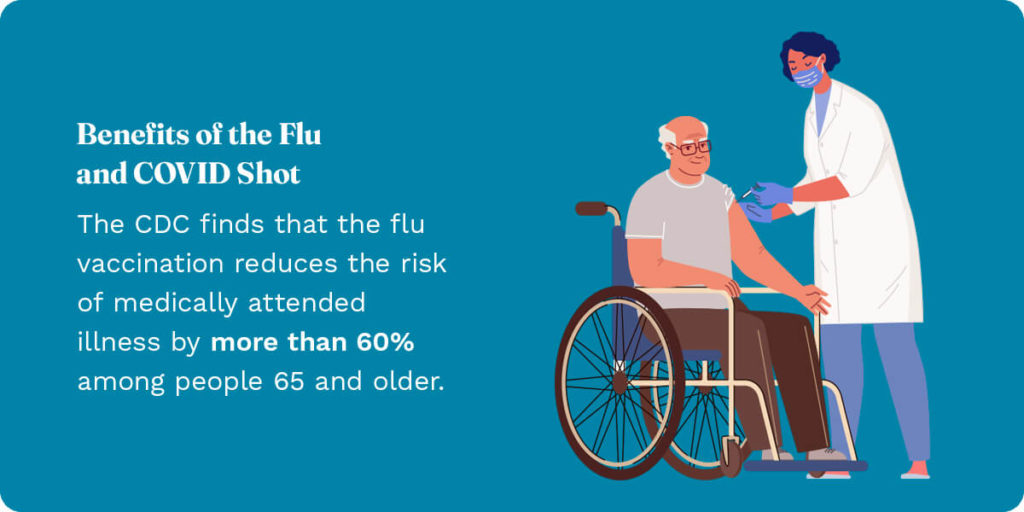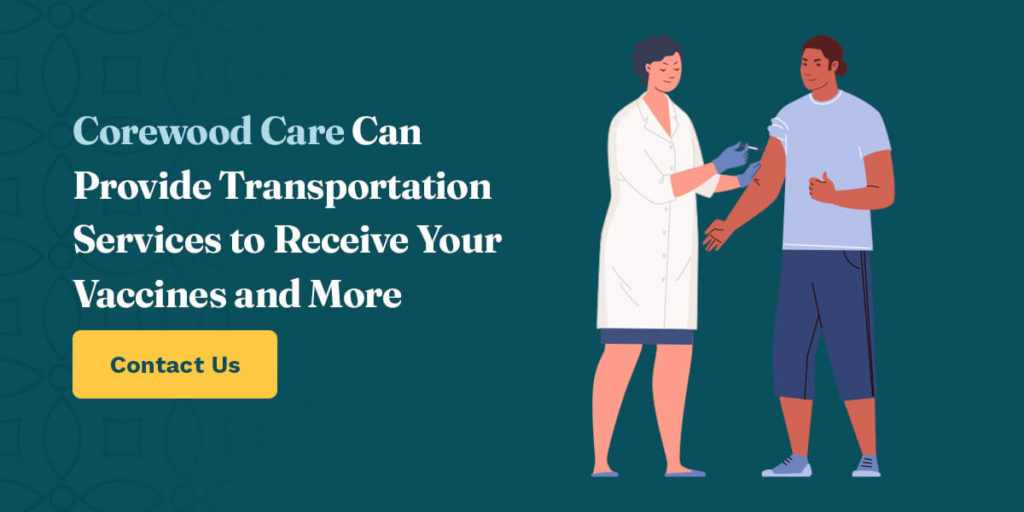Should I Get a Flu Shot or COVID-19 Booster This Winter?

Getting a flu shot and a COVID-19 vaccination or booster are two easy ways for people to protect themselves and their families against illness. Getting vaccinated is especially important for older adults who are at a higher risk for health complications caused by these illnesses. Many people can even receive both vaccines at the same time.
Keep reading to learn more about the differences between COVID-19 and flu vaccines and their benefits.
Should Older Adults Get a Flu Shot or COVID Booster?
Older adults should get both shots to protect themselves from influenza and COVID-19, which can pose serious health risks for people over 65. These vaccines can help protect you and those around you, and getting both at the same time is both convenient and safe.
The symptoms of flu and COVID-19 can be similar, and people can be infected with them simultaneously, with symptoms posing a severe risk for adults 65 and over. That’s why experts advise the best thing you can do to protect yourself and prevent hospitals from overflowing is to get immunized against these circulating viruses.
The Centers for Disease Control and Prevention (CDC) recommends older adults get a higher dosage or adjuvant flu vaccine since it can be more effective than standard-dose flu vaccines. In fall 2022, they also recommended the bivalent COVID-19 booster for those older than 5 who have already completed the first series if it has been at least two months since their last COVID-19 vaccine dose.
Older adults should speak to their health care provider for information about these vaccines to learn what is best for them.
Differences Between the Flu and COVID Shot
There are several differences between the flu and COVID-19 vaccines. While these illnesses have similar symptoms, they are not caused by the same virus. Therefore, flu and COVID-19 vaccines are designed to protect against the specific viruses that cause their illnesses.
The updated COVID-19 bivalent booster targets the original virus that causes COVID-19 and its variants. It is especially helpful for older adults and people at heightened risk for severe illness and death. In contrast, the flu shot protects against the four influenza viruses that research predicts will be most common during the upcoming season.
From what researchers know, COVID-19 spreads more easily than the flu and causes more severe illness in some people. People with COVID-19 may take longer to display symptoms and can be contagious for longer. That’s why many efforts have been made to encourage people to stay up to date on COVID-19 vaccines to reduce the risk of severe symptoms.
Like the flu shot, the COVID-19 vaccine causes an immune response, developing antibodies to protect you from getting sick.

Benefits of the Flu and COVID Shot
Getting the flu and COVID-19 shot presents several benefits. Influenza can cause serious complications, especially for older adults and people with certain medical conditions. By many estimates, the flu causes more than 400,000 hospital stays and 50,000 deaths yearly.
The CDC finds that the flu vaccination reduces the risk of medically attended illness by more than 60% among people 65 and older. It also reduces the risk of severe complications and even death caused by influenza. The same can be said about the COVID-19 vaccine, which can reduce morbidity and mortality for older adults at increased risk of health complications.
Protecting from these illnesses also relieves strain on family members and caregivers. By getting the COVID-19 booster and flu shot, you can stay healthy and spend more time with friends and family.
Flu and COVID Vaccine FAQ
Here are our answers to some of the most frequently asked questions about the flu and COVID-19 vaccines:
Can the COVID Booster or Flu Shot Make Me Sick?
You can’t get a cold or flu from the flu shot since the vaccine is made from an inactivated virus. However, some people may experience mild symptoms. Additionally, it takes up to two weeks to get protection from the vaccine, so it’s possible to get the flu in that time.
Side effects from the COVID-19 vaccine can occur as the body builds protection against the virus that causes COVID-19. Symptoms vary from person to person — some people experience mild discomfort, while others have side effects that disrupt their daily activities.
The booster shot can cause mild to moderate symptoms like:
- Fever
- Headache
- Fatigue
- Pain at the injection site
How Often Should I Get a Flu Shot?
The CDC recommends people get vaccinated once a year by the end of October, though getting it after can still provide protection during the peak of flu season.
Since flu viruses change quickly, last year’s vaccine may not protect you from this year’s virus. New vaccines are released yearly to keep up with these changes. While the vaccine helps your immune system makes antibodies to protect against the virus, they can decline over time, making it beneficial to get the flu shot every year.
People are best protected from illness when they stay up to date on recommended doses and boosters when eligible. The best advice is to discuss the vaccines with your health provider to learn more about the vaccine and what is best for you.
Can I Get a Flu Shot and Booster Shot at the Same Time?
Yes, the CDC has determined it is safe to get the flu shot and COVID-19 booster simultaneously. Getting both can ensure that you get all of the necessary vaccines in case you cannot return for additional vaccines at a later time.
Where to Get Flu Shots and COVID Booster Near Me?
Many clinics provide free community vaccines throughout the D.C. Metropolitan area. You can get a COVID-19 booster in Bethesda, MD, by going to the Maryland Department of Health website and scheduling an appointment. You can get a flu shot in Bethesda, MD, by scheduling an appointment on the Montgomery county health department website. You can also receive a flu shot and COVID-19 booster from your health care provider or neighborhood pharmacy.
Additionally, you can search for vaccination clinics on the Vaccinate Virginia website.

Corewood Care Can Provide Transportation Services to Receive Your Vaccines and More
With flu season lasting from October through February, it’s essential for older adults to get their vaccinations to protect themselves. Pairing it with the COVID-19 vaccination adds extra protection from health complications caused by both viruses.
Are you or someone you know interested in transportation services to receive vaccines? Or do they need help around the house as the side effects linger for a short time? Learn more about Corewood Care’s senior home care and personal care services. Our caregivers are some of the best in the industry and can provide care that addresses mental, physical and emotional health. We offer services throughout the D.C. Metropolitan area.
To learn more about our services, contact us today.



